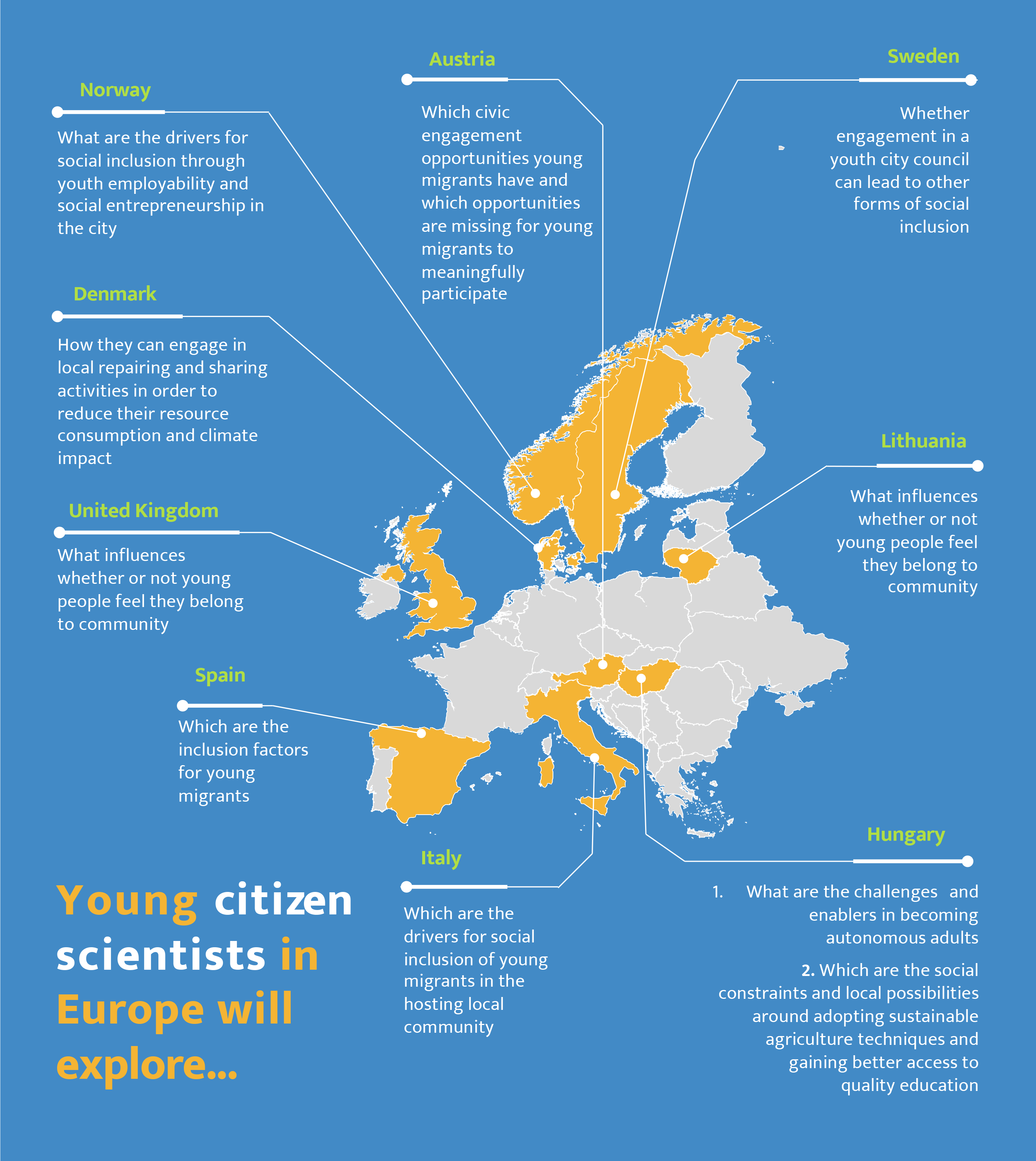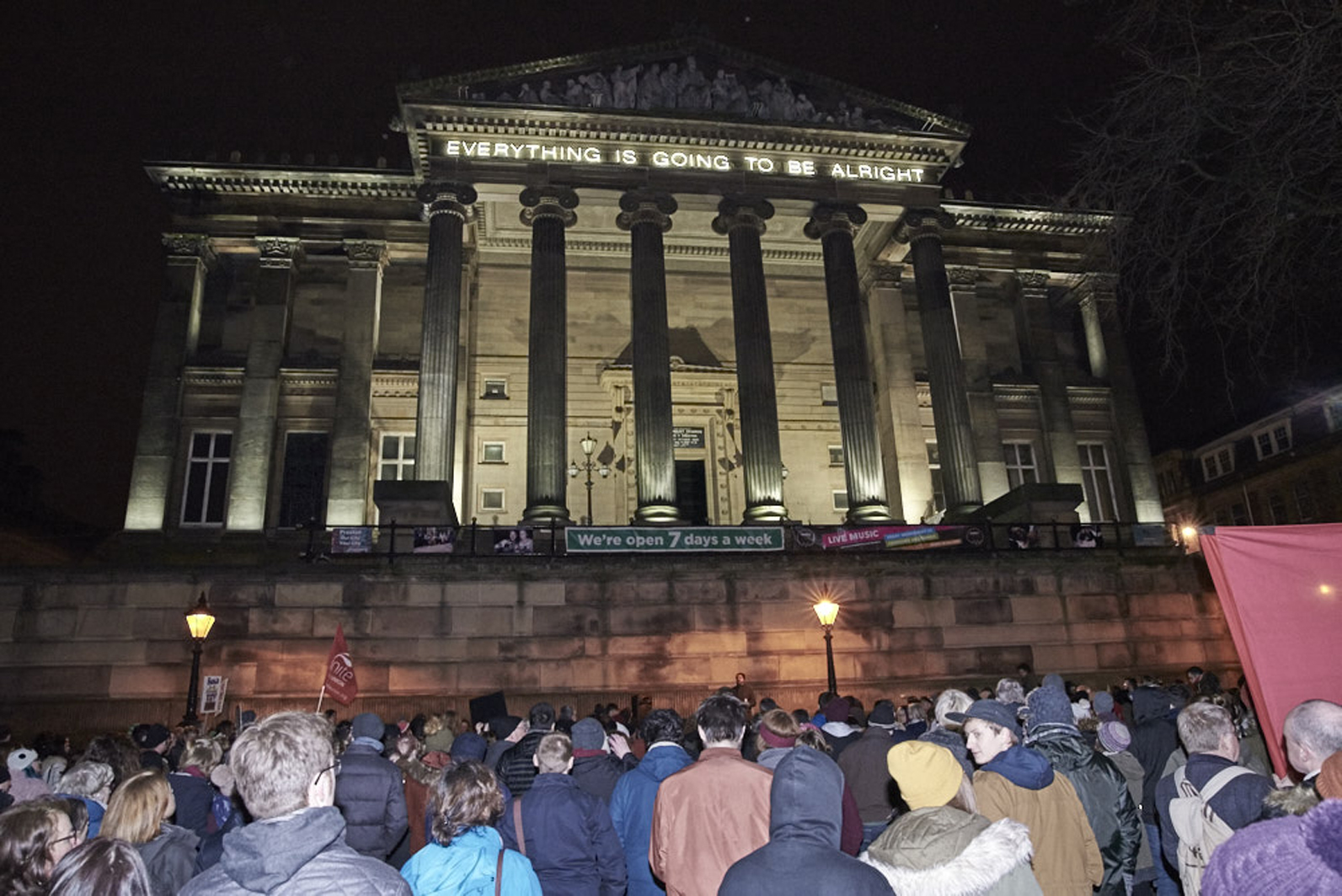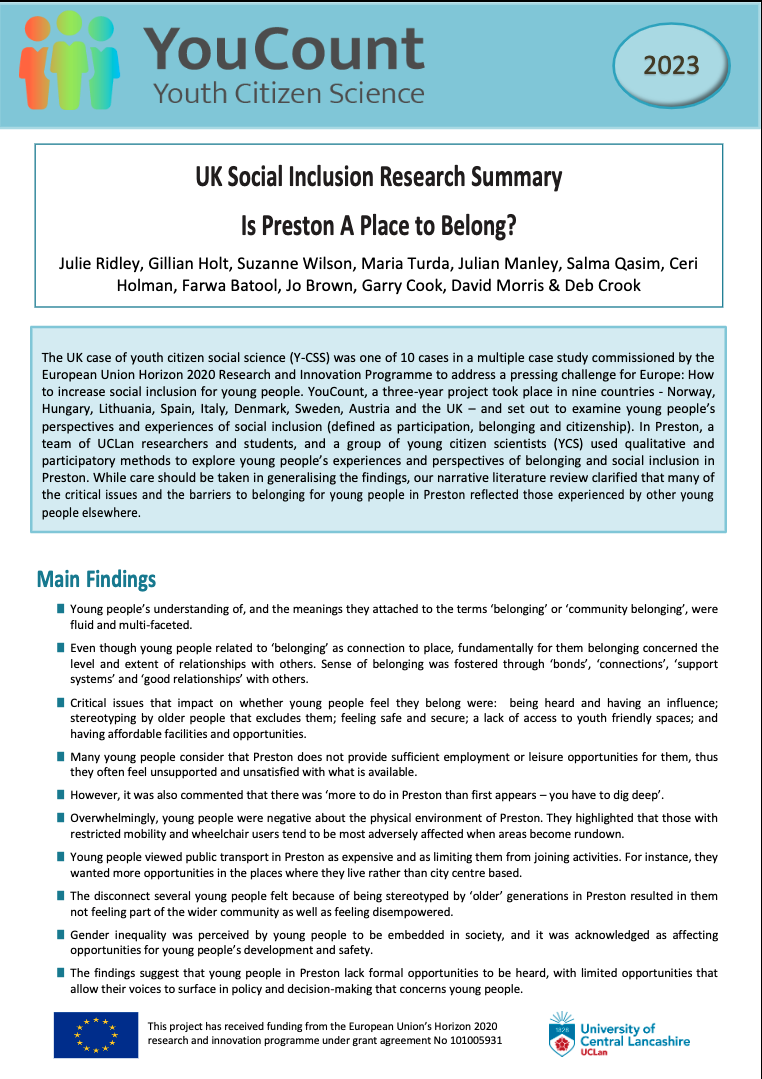Case Studies
YouCount is working to co-create new knowledge and innovations to increase youth social inclusion in ten different cases distributed in nine European countries. Although the ultimate goal of increasing social inclusion is a shared goal, each case study develops in different contexts and focuses on different groups of youth participants facing diverse social inclusion challenges.

A large number of young refugees and migrants are living in Austria and want to become part of the Austrian society. The Austrian case aims to analyze which opportunities young refugees and migrants have for participating in society. This is especially important as they often do not have official ways for making their voice heard, like voting rights.
The Danish case takes place in South Harbour Copenhagen. It is an old industrial district and is today characterized as one of Copenhagen's vulnerable areas. The area is under high development, which has divided the community into an old and a new location. Due to the economic and cultural divisions, many different social and green actions have been initiated. Still, the young people seem to be forgotten in these processes, which have left the area with no activities for the young people (14-20years).
Social inclusion of hard-of-hearing youth (Location: Szeged, Hungary) - Hard of hearing (HH) youth is a marginalized social group facing many challenges in terms of inequality in education and employment opportunities and exclusion from various social spheres. The Szeged case aims to support the social inclusion of hard-of-hearing youth in the city of Szeged by making their voices be heard. In a collaborative research setting hearing and hard of hearing senior researchers from the University of Szeged and youth work together in investigating the challenges (e.g. employment, housing etc.) HH young people perceive when entering into adulthood. By connecting urban social actors (companies, social services, schools, civil society organizations) and the HH youth the case study promotes collaborations and support networks in the city. Working together also fosters the development of innovative tools and methodologies towards inclusive science and research.
A nagyothalló fiatalok társadalmi befogadása (Helyszín: Szeged, Magyarország) - hallássérült fiatalok egy olyan érzékeny társadalmi csoport, amely számos kihívással néz szembe az oktatási és foglalkoztatási esélyegyenlőtlenség, valamint a különböző társadalmi szférákból való kirekesztés tekintetében. A szegedi eset célja, hogy támogassa a városban élő hallássérült fiatalok társadalmi befogadását, hogy hallhatóvá tegye hangjukat, történeteiket és megéléseiket. Egy kollaboratív kutatás keretében a Szegedi Tudományegyetem részvételével hallássérült és halló senior és fiatal kutatók együtt vizsgálják azokat a kihívásokat (pl. foglalkoztatás, lakhatás stb.), amelyeket az érintettek a felnőttkorba lépve érzékelnek. A városi szereplők (vállalatok, szociális szolgáltatások, iskolák, civil szervezetek) és a hallássérült fiatalok összekapcsolásával az esettanulmány elősegíti az együttműködést és a támogató hálózatok kialakulását, erősödését a városban. A közös munka elősegíti az innovatív eszközök és módszerek kifejlesztését a kutatás inkluzívvá tételében.
Hungary/Siklósbodony - Social inclusion and community cohesion through rural social innovations: This Hungarian case is located in Siklósbodony, a small village of 140 inhabitants in Southern Hungary, which has lost almost all its public institutions (the kindergarten, the local store, the post office) during the last two decades. Members of the research team are local young people who meet the typical difficulties in isolated rural settlements in the area: limited access to quality education, scarce job opportunities, high travel costs combined with law wages, and ethnic discrimination against the Roma. Research participants are now engaged in developing a socially innovative, sustainable agriculture farm which, beyond providing job opportunities, may also strengthen local community cohesion. In collaboration with bio-agriculture experts (Hungarian Permaculture Association), documentary filmmakers (ELTE Media Studies Department) and social scientists (Participatory Research Forum) the team intends to carry out a small-scale research program anchored in citizen social science to document and reflect the learnings in a co-creative way, and to identify the various social causes behind perceived success and failure during the innovation process.
Magyarország/ Siklósbodony - Szociális inkluzió és közösségi kohézió egy kistelepülési társadalmi innovációs folyamatban: Siklósbodony egy 140 fős aprófalu Baranya Megyében, amely az elmúlt két évtizedben elveszítette a közösségi intézményeit (az óvodát, a postát, a kisboltot), a helyi fiatalok helyzetét pedig meghatározza az iskolai mobilitási csatornák beszűkülése és az elérhető munkapiaci pozíciók és jövedelemszerzési lehetőségek változékonysága. A kutatócsoportban részt vevő fiatalok elkötelezetten működnek közre egy helyi permakultúrás gazdaság létrehozásában, amely nem csak munkalehetőségeket, hanem erősebb közösségi kohéziót is eredményezhet faluban. A Magyar Permakultúra Egyesület agrármérnökeivel, az ELTE Média Tanszék dokumentumfilmeseivel és a Parforum kutatóival együttműködve olyan közös alkotáson alapuló civil társadalomtudományi programot szeretnénk megvalósítani, amely dokumentálja és értelmezi az innovációs folyamat tanulságait, azonosítva a folyamat közben észlelt “kudarcos” és “sikeres” helyzeteket előállító társadalmi okokat is.
The Italian case takes place in Naples, Italy, and aims at fostering social cohesion in the Neapolitan urban community by providing local and immigrant citizens with further opportunities to socialize, meet, and exchange perspectives and viewpoints. Indeed, in Naples, the high presence of foreign residents does not always correspond to a process of active social inclusion. The Department of Humanities of the University of Naples Federico II coordinates the Italian case. Moreover, it endeavors to promote a local social network involving local socially and civically active associations for the implementation and sustainability of the case. Along with local associations, a group of about 10 youths – both local and migrant ones – was recruited and trained to involve them in the case as citizen scientists.
Il caso italiano si svolge a Napoli, in Italia, e mira a promuovere la coesione sociale nella comunità territoriale locale fornendo a cittadini locali e migranti maggiori opportunità di socializzazione, incontro e occasioni di scambio di punti di vista. Infatti, a Napoli l'alta presenza di residenti stranieri non sempre corrisponde ad un processo di inclusione sociale attiva. Il Dipartimento di Studi Umanistici dell'Università degli Studi di Napoli Federico II coordina il caso italiano. Inoltre, si impegna a promuovere una rete sociale locale che coinvolga associazioni locali socialmente e civicamente attive per l'implementazione e la sostenibilità del caso. Insieme alle associazioni, un gruppo di circa 10 giovani cittadini - sia locali sia migranti - stati reclutati e formati per coinvolgerli nel caso come citizen scientists.
Contact:
Prof. Fortuna Procentese,
University of Naples Federico II,
scientific officer, This email address is being protected from spambots. You need JavaScript enabled to view it.
Social participation in Norway: Empowering local youth in their quest for social inclusion through employment and social entrepreneurship in Oslo - The Norwegian case is located in the area of Gamle Oslo district, the city's second most populated district. Diversity and a great variation in living conditions characterize Gamle Oslo and provide challenges as well as opportunities for its youth. The researchers from OsloMet are particularly interested in existing (or lacking) job opportunities for local youth, and how social entrepreneurs, non-profit organizations, non-governmental organizations, and public institutions can increase these opportunities. To find out more, young co-researchers from Gamle Oslo will engage in dialogue forums, living lab sessions, a national workshop, participant observation, fieldnotes, walkalongs, surveys, debriefs, logging as well as developing and testing of the Spotteron app. The entire research team explores the following questions: How is the experience of social inclusion among young people in Gamle Oslo District connected to employability and social entrepreneurship? How are opportunities for work and social enterprise located within the community of Gamle Oslo district? What are the challenges when it comes to social inclusion for youth and young adults in the larger society of Norway? The young co-researchers will engage local stakeholders from both the private and public sector in finding creative ideas to develop local job opportunities for youth. The Intercultural Museum (IKM) will serve as a living lab, making it a hub for all the project activities.
Det norske caset vil foregå i bydel Gamle Oslo, en bydel som kjennetegnes av mangfold og stor variasjon i levekår, noe som fører til både utfordringer og muligheter for lokal ungdom - Forskerne i OsloMet-teamet er spesielt interessert i eksisterende (eller manglende) jobbmuligheter for lokal ungdom, og vil finne ut hvordan sosiale entreprenører, lokale ideelle organisasjoner, frivillige organisasjoner og offentlige institusjoner kan øke disse mulighetene. Sammen med lokale ungdomsforskere vil forskerteamet utforske spørsmålene: Hvordan er opplevelsen av sosial inkludering blant unge i bydel Gamle Oslo knyttet til arbeid og sosialt entreprenørskap? Hvordan er mulighetene for arbeid og sosial virksomhet lokalisert i Gamle Oslo bydel? Hva er utfordringene når det gjelder sosial inkludering for ungdom og unge voksne i storsamfunnet i Norge? Ungdomsforskerne i prosjektet vil gjennomføre spørreundersøkelser, intervjuer, deltagende observasjon, samt delta på dialogforum og living lab sesjoner. De vil dokumentere forskiningsprosessen underveis og analysere dataene de samler inn. I tillegg vil ungdomsforskerne engasjere lokale samarbeidspartnere (stakeholders) fra både privat og offentlig sektor for å sammen kunne utvikle kreative ideer for å gi ungdom bedre jobbmuligheter. Interkulturelt museum (IKM) på Grønland vil fungere som et levende laboratorium (living lab) og vil dermed bli et knutepunkt for all aktivitet som foregår i prosjektet.
The Spanish case takes place in Gipuzkoa, a province where foreign unaccompanied minors and young adults (mainly from Morocco) have reached a significant number. While an efficient care protection system has been developed for minors, when they turn 18 and leave child protection services, both the young adults and the system struggle to address their new reality. The case seeks to understand the views and experiences of young migrants with marginalization, social inclusion, and their chances and difficulties to find a job. Orkestra and the Social Work area of the Faculty of Social and Human Sciences of the University of Deusto coordinate the Spanish case. Moreover, the two local NGOs Loiola Etxea and Agintzari-Zabalduz are involved and have helped recruit two groups of about 10 youngsters. The Provincial Council of Gipuzkoa also participates in the project because they want to improve their strategies of social and labor insertion, which can facilitate the transition of young migrants to adult life.
Espainiako kasua Gipuzkoan aztertzen da. Lurralde honetan, esanguratsua da inoren kargura ez dauden atzerritar adingabe eta heldu gazteen kopurua, bereziki Marokotik etorriak. Adingabekoak babesteko sistema efizientea garatu bada ere, 18 urte betetzen dituztenean eta adingabeak babesteko zerbitzuak uzten dituztenean, bai gazteek eta bai sistemak errealitate berri horri aurre egiteko ahaleginak egiten dituzte. Kasuaren helburua da gazte migratzaileek bazterketaren, gizarteratzearen eta lanpostu bat aurkitzeko aukera eta zailtasunen aurrean dituzten iritziak eta esperientziak ulertzea. Orkestrak eta Deustuko Unibertsitateko Gizarte eta Giza Zientzien Fakultateko Gizarte Laneko arloak koordinatzen dute Espainiako kasua. Gainera, tokiko bi gobernuz kanpoko erakundek, Loiola Etxeak eta Agintzari-Zabalduzek, proiektuan parte hartzen dute eta 10 gazte inguruko bi talde osatzen lagundu dute. Gipuzkoako Foru Aldundiak ere parte hartzen du proiektuan, gizarteratze eta laneratze estrategiak hobetzeko, gazte migratzaileei bizitza heldura igarotzen laguntzeko baliagarriak izan baitaitezke.
El caso español tiene lugar en Gipuzkoa, provincia donde los menores y adultos jóvenes extranjeros no acompañados (principalmente de Marruecos) han alcanzado un número significativo. Si bien se ha desarrollado un sistema de protección de atención eficiente para los menores, cuando cumplen 18 años y dejan los servicios de protección de menores, tanto los jóvenes como el sistema luchan por enfrentar su nueva realidad. El caso busca comprender las opiniones y experiencias de jóvenes migrantes con respecto a su marginación, inclusión social y sus posibilidades y dificultades para encontrar un trabajo. Orkestra y el área de Trabajo Social de la Facultad de Ciencias Sociales y Humanas de la Universidad de Deusto coordinan el caso español. Además, las dos ONG localesLoiola Etxea y Agintzari-Zabalduz están involucradas y han ayudado a reclutar dos grupos de unos 10 jóvenes. La Diputación Foral de Gipuzkoa también participa en el proyecto porque quiere mejorar sus estrategias de inserción social y laboral, que puedan facilitar la transición de los jóvenes inmigrantes a la vida adulta.
Botkyrka is a highly diverse municipality south of Stockholm. Among the 95.000 inhabitants, about 100 languages are spoken, and 59 percent are either themselves born in another country or have parents who are both born abroad. In the Botkyrka Youth Council (BYC), young citizens between 13–22 years, can partake in local policymaking to influence social, political and environmental decisions affecting the young community. With 20 years of experience, BYC sees civil-society engagement as an important factor for social inclusion among young Botkyrka citizens. At the same time, they are aware that many young people experience challenges against such engagement. In the Swedish case, we will investigate how engagement in BYC can lead to other forms of social inclusion, such as work, education, social life. We will also explore how more young people in Botkyrka can engage with the BYC.
Botkyrka är en kommun söder om Stockholm, med stor etnisk och kulturell mångfald. Bland de 95 000 invånarna i kommunen talas cirka 100 språk, och 59 procent är antingen själva födda i ett annat land än Sverige, eller har föräldrar som båda är födda utomlands. I Botkyrka ungdomsfullmäktige (BUF) kan unga människor mellan 13–22 år delta i det lokala beslutsfattandet kring sociala, politiska och miljörelaterade beslut som påverkar den unga befolkningen. Med 20 års erfarenhet av att engagera unga i ideellt arbete, ser BUF det ideella engagemanget som en viktig faktor för delaktighet i samhället bland Botkyrkas ungdomar. Samtidigt är de medvetna om att många unga människor upplever hinder mot att själva engagera sig. I vår svenska del av YouCount kommer vi att undersöka hur deltagande i BUF kan leda till andra former av delaktighet i samhället, såsom arbete, utbildning och socialt liv. Vi kommer även att undersöka hur fler unga människor i Botkyrka kan involveras i BUF.
The UK case is based in Preston, in North West England. There is little research from young people's own perspectives on their sense of belonging to their location or what enables and gets in the way of this. Also, rarely have young peoples’ perspectives and ideas for solutions been considered in UK policy and practice. The Preston case will explore young people’s views and ideas about what it means to belong in their communities, and what enables and gets in the way of belonging. Arts-based and participatory methods will enable young people aged 14-19 to engage with each other in exploring the place, connections, relationships, and social action as part of a co-creative approach to citizen social science. An ambition is to have a long-lasting impact through creating an intergenerational co-operative, where young people form the majority membership and local decision-makers agree to consider young people’s research as expert opinion in matters affecting their lives.
The Lithuanian case takes place in Panevezys district municipality, located in the middle-north of the country. Agricultural land covers around 60% of the municipality territory. As a post-soviet society Lithuania faces low participation in community activities, which accounts for a low participation of youth in economic, political and social activities. The particular region in focus is also noted for low employment opportunities, which result in youth emigration (inside the country and abroad). A key ambition of this case study is to strengthen the youth sense of belonging and connectedness to local community and at same time combating emigration and unemployment issues through citizen science. The concept of citizen science is very new in Lithuania, thus there is no clear policy supporting it. Currently there are not many citizen science projects in Lithuania, especially in rural areas. On the other hand, there is a potential to engage young people from rural regions to be interested in citizen science and contribute to solving problems of social apathy and social exclusion. Kaunas University of Technology coordinates the implementation of the Lithuanian case, engaging young people to be part of the project YouCount by offering new ways of strengthening youth social belonging and connectedness to the place.
Lietuvos atvejis vyksta Panevėžio rajono savivaldybėje, esančioje šalies vidurio šiaurėje. Žemės ūkio paskirties žemė užima apie 60 % savivaldybės teritorijos. Lietuva, kaip posovietinė visuomenė, susiduria su mažu jaunimo dalyvavimu bendruomeninėje veikloje, o tai lemia menką jaunimo dalyvavimą ekonominėje, politinėje ir socialinėje veikloje. Konkretus nagrinėjamas regionas taip pat pasižymi menkomis įsidarbinimo galimybėmis, o tai lemia jaunimo emigraciją (šalies viduje ir į užsienį). Pagrindinis šio atvejo tyrimo siekis - stiprinti jaunimo priklausymo vietos bendruomenei jausmą ir ryšį su ja, kartu kovojant su emigracijos ir nedarbo problemomis pasitelkiant piliečių mokslą. Piliečių mokslo koncepcija Lietuvoje yra labai nauja, todėl nėra aiškios ją remiančios politikos. Šiuo metu Lietuvoje nėra daug piliečių mokslo projektų, ypač kaimo vietovėse. Kita vertus, yra potencialo sudominti kaimo regionų jaunimą piliečių mokslu ir prisidėti prie socialinės apatijos ir socialinės atskirties problemų sprendimo. Kauno technologijos universitetas koordinuoja Lietuvos atvejo įgyvendinimą, įtraukdamas jaunimą į projektą "YouCount", siūlydamas naujus būdus stiprinti jaunimo socialinę įtrauktį ir ryšį su vietos bendruomene.
This website uses no external trackers, no analytics, just session cookies and values your online privacy.



